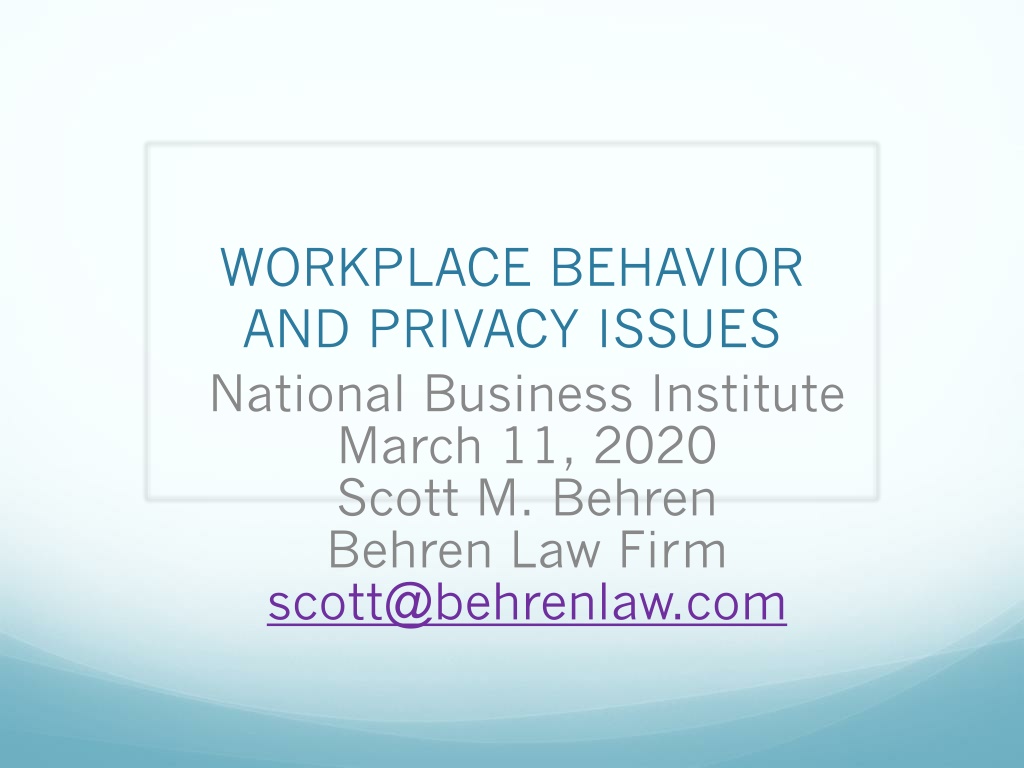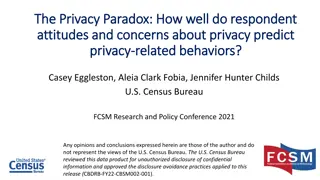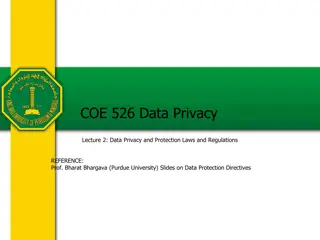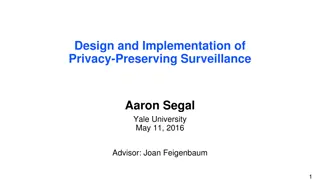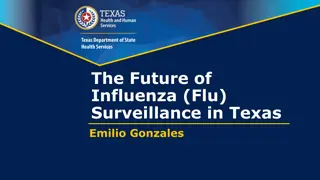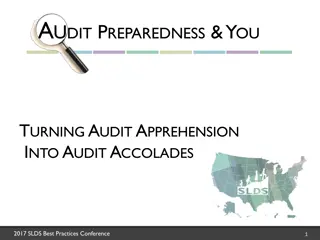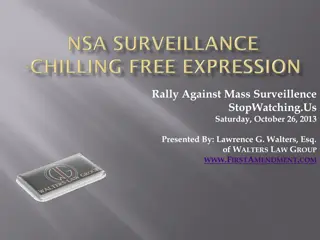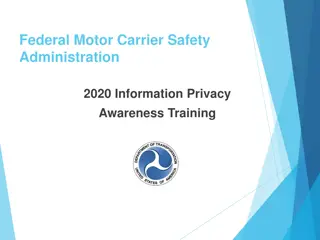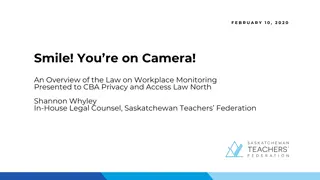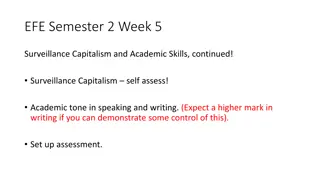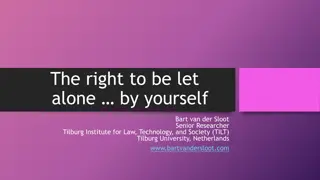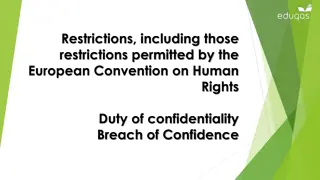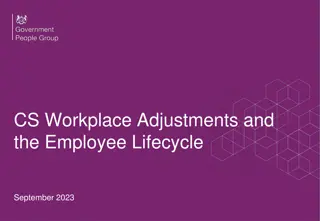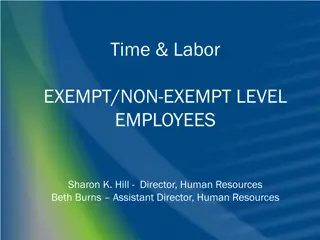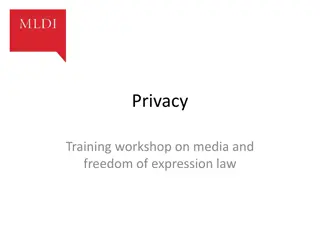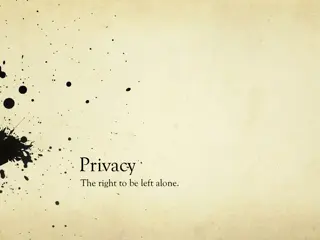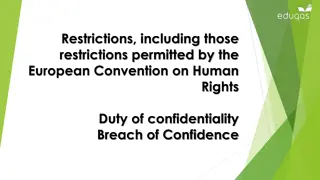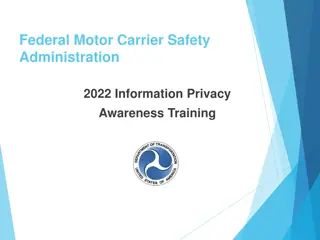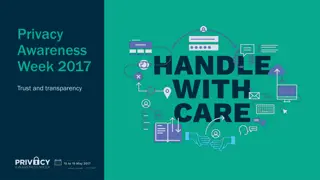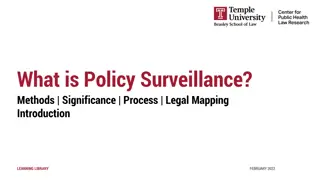Understanding Employee Surveillance and Privacy Laws in the Workplace
This article discusses the legality and implications of employee surveillance in the workplace, covering topics such as video and audio recording, GPS tracking, searches of personal belongings, and employer monitoring of electronic communications. It highlights relevant statutes and court cases, providing insights into the boundaries of privacy rights for employees and the rights of employers to monitor their workforce.
Uploaded on Sep 15, 2024 | 0 Views
Download Presentation

Please find below an Image/Link to download the presentation.
The content on the website is provided AS IS for your information and personal use only. It may not be sold, licensed, or shared on other websites without obtaining consent from the author. Download presentation by click this link. If you encounter any issues during the download, it is possible that the publisher has removed the file from their server.
E N D
Presentation Transcript
WORKPLACE BEHAVIOR AND PRIVACY ISSUES National Business Institute March 11, 2020 Scott M. Behren Behren Law Firm scott@behrenlaw.com
Employee Surveillance Videotaping of Employees Generally seems to be acceptable under Federal law and most state laws. 55% of Employers do it to monitor theft and productivity CT, Del and CA, require notice be given to employees in the event of videotaping Audiotaping of Employees Regularly done when for business purpose Pay attention to state statutes on audio recording
Employee Surveillance Statutes California-Labor Code Section 435(a) Imposes liability on employers for causing an audio or video recording to be made of an employee in a restroom, locker room, or room designated by an employer for changing clothes unless authorized by court order.
Employee Surveillance Used in many instances to confirm workers compensation injuries or FMLA legality Generally can monitor business calls of employee, but see state laws in each jurisdiction GPS tracking of employees especially with company vehicles generally OK
Employee Surveillance Cases Gloria Schibursky v. IBM, 820 F .Supp. 1169 (D. Minn. 1993) Employee sued employer for infliction of emotional distress based upon surveillance of employee Employers routinely engage in a variety of practices in order to confirm the accuracy of employee records including time cards Did not rise to level of infliction of emotional distress
Searches of Desks, Smartphones, Lockers, Vehicles Equipment Electronic Communications Privacy Act (ECPA)- employer provided computer system is property of the employer. Therefore, employers that provide employees with computer system and internet access are free to monitor them. Especially where Employer has written policy on monitoring of computer use
Searches of Desks, Smartphones, Lockers, Vehicles Equipment O Connor v. Ortega, 480 US 709 (1987)(SCOTUS) Employees may have a reasonable expectation of privacy against intrusions However, an employees expectations of privacy in their offices, desks and file cabinets may be reduced by virtue of actual office practices Whether an employee has a reasonable expectation of privacy in his or her workplace must be assessed on a case by case basis An office is seldom a private enclave free from entry by supervisors, other employees and business and personal invitees
Searches of Desks, Smartphones, Lockers, Vehicles Equipment Brenda Lee Dawson v. State of Texas, 868 SW2d 363 (Tex. App. 1993) Related to search of locker of exotic dancer We hold that where an employee who is hired to dance or perform has been issued a private locker by her employer on which she has placed a lock, it is reasonable to expect that her belongings will be stored without being subject to search, unless she has been placed on notice of the possibility of such a search. Courts have held that employees have a reasonable expectation of privacy in their desks or lockers provided that is it not shown that employees knew that others could search or have access to the locker or desk
Searches of Desks, Smartphones, Lockers, Vehicles Equipment Brenda Lee Dawson v. State of Texas, 868 SW2d 363 (Tex. App. 1993) (Continued) Warrantless searches of lockers or desks ok where some notice of potential searches was posted or given or that others were known to have access to the locker so that there was a diminished expectation of privacy.
Searches of Desks, Smartphones, Lockers, Vehicles Equipment United States v. Nikolaus Storm Wadlow, Case No: 15- 00412-01-CR-W-DW (W.D. Mo. 2016) Wadlows s expectation of privacy in his workplace locker was less than an individual would have in his residence, but the locker did exhibit some level of privacy Employee does have expectation of privacy in personal containers such as duffle bags
Searches of Desks, Smartphones, Lockers, Vehicles Equipment State of New Jersey v. Anthony R. Coleman, Case No: A-1309-16TI Employee had no reasonable expectation of privacy in locker where employer had a No Weapons Policy and where its Employee Handbook provided that Employer reserved the right to search Company property including lockers, desks, workplaces, storage areas, etc. and any items located on Company property whether they belong to the Company employees, contractors or visitors
Searches of Desks, Smartphones, Lockers, Vehicles Equipment United States v. Aron Lichtenberger, 19 F .Supp.3d 753 (N.D. Ohio 2014) Pertained to search of laptop Laptops are highly personal items which contain a multitude of personal information and laptop owners have a reasonable expectation or privacy in their files. Violation of Fourth Amendment by searching laptop without getting a warrant
Searches of Desks, Smartphones, Lockers, Vehicles Equipment Raymond Kelly v. State of Florida, Case No: 4D09- 2436 (Fla. 4thDCA 2012) Employee had no expectation of privacy where office was shared with another employee and other employees had full access to the office and no locks on the desk or desk drawers And GM consented to search
Monitoring Employee Communications Calls, Emails and Internet Use Employer can monitor keystrokes, emails and screens Employer not allowed to intercept private emails or use personal log ins or passwords Connecticut and Delaware require employers to notify employees that their emails are being monitored.
Monitoring Employee Communications Calls, Emails and Internet Use Falmouth Fire Fighters Union Local v. Town of Falmouth, Commonwealth of Massachusetts Case No: 09-517 Employee had no expectation of privacy in emails sent over employer email systems even if emails were private City had email policy stating that the town had ability to access any messages transmitted over the email system and that employees should not assume they are confidential
Monitoring Employee Communications Calls, Emails and Internet Use Telephones Employers may listen to phone calls at work especially to monitor contact with clients or quality control Electronic Communications Privacy Act does allow monitoring for business related calls California-law requires that they be informed that the conversation is recorded or monitored
Monitoring Employee Communications Calls, Emails and Internet Use Smart Phones Employer provided smart phones can generally be monitored.
Monitoring Employee Communications Calls, Emails and Internet Use States that require consent of all parties to record conversations CA, CT, FL, Ill, Md, Mass, Michigan, Montana, Nevada, New Hampshire, Pa, Washington See, https://www.rcfp.org/wp- content/uploads/imported/RECORDING.pdf State by State Guide to taping calls and conversations
Dress Code/Personal Appearance Dress codes permitted based upon business needs and culture of business Don t base dress codes on legally protected factors (i.e. religion, etc.) Make sure dress code policy is specifically set forth but leave room for flexibility to deal with issues such as religious and disability accommodations Employee can request accommodation of dress codes under the ADA If require uniforms make sure that you take into account FLSA issues as to who paysfor and maintains the uniforms
Dress Code/Personal Appearance Joshua J. Wolfgram v. G4S Secure Solutions (USA), Inc., Case 18cv198 (N.D. Ind. 2018) Employee written up for wearing non-issued uniform pants Employee claims failure to engage in interactive process re: the uniform and his disability Motion to Dismiss Granted where Complaint did not indicate how the poor quality uniform pants related to his arthritic condition
Dress Code/Personal Appearance Jocelyn Jones v. Spherion Atlantic Enterprise, LLC, Case No: 11-16033 (11thCir. 10/17/12). African American employee employee alleged discriminatory application of dress code Trial Court affirmed. Reprimand for violation of dress code was not adverse employment action. Employee offered no evidence to show that the reprimand impacted the terms and conditions of her employment in any real an demonstrable way.
Dress Code/Personal Appearance Cloutier v. Costsco Wholesale Corp, 390 F .3d 126 (1stCir. 2004) Employee religious discrimination claim over Costco s no facial jewelry policy as a violation of her religious practice as a member of the Church of Body Modification Trial court granted summary judgment since Costco allowed her to work if she covered her facial piercing with a band aid or with a clear retainer. Affirmed by the appeals court Employer needs to balance the religious requirements of employee with interests in keeping professional appearance
Drug and Alcohol Testing Permissible But, states and localities all have their own very specific drug testing policies and laws that must be closely followed Make sure employer has a written drug testing policy putting employees on notice as to types of testing, the types of conduct prohibited and the consequences for refusing to test and for testing positive as well as the procedure to be followed Make sure its reviewed to comply with local and state regulations
Drug and Alcohol Testing Make sure employees sign a receipt for review of the drug testing policy Make sure supervisors are aware of policy, trained on it and know how to apply it. Make sure to set forth clearly the repercussions for a refusal to test by employee Make sure to take into account the status of recreational and medical marijuana in your state
Drug and Alcohol Testing Be careful of post accident drug testing. Recent OSHA guidance stating that for post accident testing should have been a reasonable possibility that drugs or alcohol contributed to the accident. Testing after every trivial accident or injury could be considered discriminatory and a violation of discrimination and workers compensation laws.
Psychological and Personality Tests May be used for hiring purposes May be used for promotion purposes May be used for placement Types of tests frequently used Myers- Briggs The DiSC Model Five Factor Model
Off-Duty Behavior and Activities Not clear cut. At least 30 states have laws that in some way limit and employers ability to discipline employees for lawful activities outside the workplace. Some states such as CA even prohibit termination of employees for criminal arrest (such as DUI or domestic dispute) Some states regulate when employees can use lawful products off work premises (i.e. such as tobacco and alcohol)
Off-Duty Behavior and Activities Some states regulate whether employers can punish employees for holding certain political views
